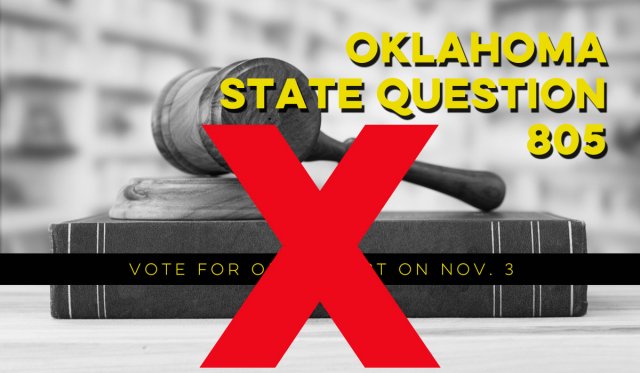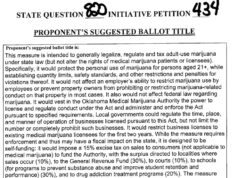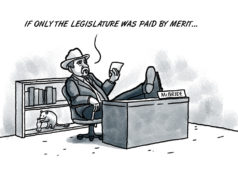
With more than 90 percent of state precincts reporting, State Question 805 has been rejected by Oklahoma voters today with 60.9 percent of voters opposing the criminal justice ballot initiative at the time of this post’s publication.
SQ 805 would have amended the Oklahoma Constitution to end sentence enhancements for people formerly convicted of non-violent felonies. An individual convicted of a nonviolent felony would have still been sentenced up to the maximum time allowable for that that offense, but the person would not receive added sentence time owing to prior felony convictions.
Under Title 21, Section 51.1 of state statute, district attorneys can enhance the sentences of individuals with prior, nonviolent felony convictions if they are charged with another felony within 10 years of the completion of the sentence for their prior conviction. SQ 805 looked to change that and would have been an amendment to the state’s constitution, which has supremacy over state statute.
SQ 805 did not apply to anyone that has been convicted of a violent felony, as defined as of Jan. 1, 2020, in state statute. Violent felonies in Oklahoma include crimes such as murder, kidnapping, child abuse, rape and robbery. But opponents of SQ 805 argued it was problematic that crimes like domestic violence via strangulation and driving under the influence would not be included in the definition.
The group Oklahomans United Against 805 expressed concern that the measure would “create a culture where crime is OK in Oklahoma by reducing penalties for career criminals.”
Similarly, Gov. Kevin Stitt had expressed concerns over SQ 805, saying “to put sentencing reform inside our constitution is the wrong way to do that. It basically ties the hands of our prosecutors and district attorneys.”
Oklahoma has one of the highest incarceration rates in the world at 1,079 per 100,000 people. The Oklahoma Council of Public Affairs estimates that SQ 805 would have reduced the state’s prison population by 8.5 percent as well as state expenses between $45 million and $186 million over the next 10 years.
Election results are not final until they are certified by the Oklahoma State Election Board.
‘Yes on 805’ releases statement
Advocacy group in favor of the measure, Yes on 805, released a statement after the State Question was rejected.
“This campaign has shown that the status quo of Oklahoma’s top imprisonment rates and overcrowded prisons is not acceptable. Our state spends more than half a billion dollars on the prison system each year, and we can no longer afford a ‘tough on crime’ mentality that actually means ‘tough on taxpayers’ and ‘tough on families,’” said Sarah Edwards, president of Yes on 805, in the statement. “We need reform now. We demand the Oklahoma Legislature act on common-sense criminal justice reform this legislative session.”
Oklahomans United Against 805 responds
Oklahomans Unite Against 805 also released a statement after the measure was rejected at the polls.
“Thank you to the voters. It proves that grassroots and Oklahomans control their own destiny,” former Oklahoma Gov. Frank Keating said in the statement. “Our constitution cannot be bought by out-of-state interests. It took an incredible team, not the least of which are our elected leaders, Gov. Kevin Stitt, Lt. Gov. Matt Pinnell, Attorney General Mike Hunter and so many others. When we started it was an uphill battle, but these three leaders stood strong to do what was right — not just that which appeared to be politically expedient.”
(Update:This article was updated at 10:40 p.m. Tuesday, Nov. 3, to include a statement from Sarah Edwards, president of advocacy group Yes on 805. It was updated again at 11:15 p.m to include a statement from Oklahomans United Against 805.)





















